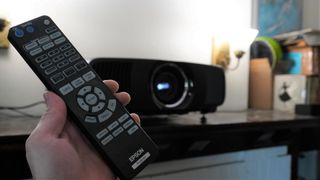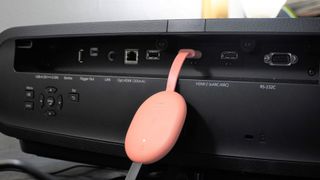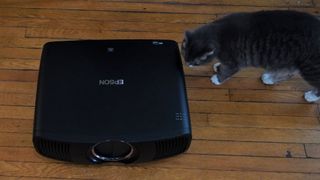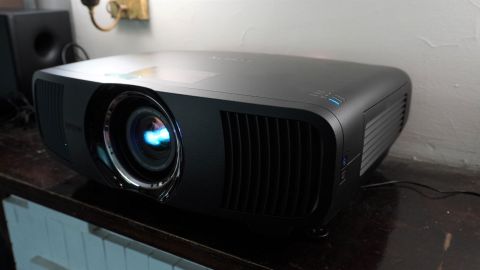TechRadar Verdict
The Epson Pro Cinema LS12000 shames most other projectors with the might of its imagery and flexibility, but it needs a good sound system and might entail some long cable runs. Recommended for those seeking the highest quality at-home movie-viewing experience.
Pros
- +
Excellent image quality
- +
Highly flexible placement
- +
Ready for games and film
Cons
- -
High price
- -
Display only
- -
Few ports
Why you can trust TechRadar
Editor's note
• Original review date: June 2022
• Current flagship Epson 4K projector
• Launch price: $4,999 / £4,499 / AU$8,999
• Target price now: $4,999 / £4,499 / AU$8,999
The Epson Pro Cinema LS12000 has remained the company’s flagship long throw 4K projector since we first reviewed it back in 2022. A 3LCD model with a laser light engine, the LS12000 delivers stunning picture quality for movies and gaming and still sits at the top of our best 4K projectors guide as the best overall option. The LS12000 doesn’t get discounted on a regular basis, although we did see it drop to £3,999 in the UK during Black Friday, so expect to pay full price outside of major sales events. The rest of this review remains as previously published.

Epson Pro Cinema LS12000: One-minute review
If you’re looking to find one of the best 4K projectors out there, you don’t have to look further than the Epson Pro Cinema LS12000. This machine is delivering powerful technology that shines an almost unbeatable image. It comes at a predictable high price, though, and Epson has gone all-in on the picture-side of the equation, leaving you to fend for yourself when it comes to video sources and audio.
The LS12000 is a beefy (we’re talking 50 pounds) laser projector with a 3LCD system inside. This combination provides a bright light source for both color and white output, powerful contrast, and no artifacts we could detect. It’s an immaculate picture that doesn’t struggle to overcome bright lighting conditions in a room and then can step up to simply blow us away when we turn out all the ambient light.
The sharp and colorful visuals are also easy to get just how we want them. With zoom, lens shift, focus, and keystone controls, all we have to do is set the projector where we want it and then move and adjust the image to our ideal size and position. There’s a lot of flexibility for big rooms and even bigger rooms, though we wouldn’t recommend going all out like this for a small space — this is a serious home theater projector.
The Epson Pro Cinema LS12000 won’t make sense for a lot of people. But those who want the best and will set out to complement it with a capable AV receiver and robust sound system will likely be pleased as a peach with the LS12000.
Epson Pro Cinema LS12000 review: Price and availability
The Epson Pro Cinema LS12000 is available for $4,999 (£4,399, about AU$7,090), while the company’s lower-spec LS11000 (2500 lumen brightness and 1,200,000:1 contrast ratio) is available for $3,999 (£4,099, about AU$5,670).

Epson Pro Cinema LS12000 review: Design and features
- 48Gbps HDMI 2.1 ports (1x eARC) with 4K/120Hz support
- No Smart TV platform or speakers
- Hardware zoom and lens shift
The LS12000 is a bit of a beast. This isn’t your little shelf-top projector you set at the back of the room for a casual home theater. This is a purpose-built machine for a next-level home cinema. It comes in a substantial housing that feels well-built, looks elegant, and is actually not overwhelmingly heavy despite its size.
The LS12000 is ready for a variety of setups and flexes to meet its positioning. We set our unit up on a mantel at the back of a living room, roughly 14 feet from the opposite wall. Thanks to the projector’s optical zoom, we can easily squeeze down the image to fit in the available space on our wall without sacrificing detail (as with digital zoom). From there, the wide vertical and horizontal lens shift range lets us further center the picture all without having to move the projector. Essentially, it’s easy to find a convenient place to set the projector and then use its powerful adjustment tools to project the image where it fits best. The projector doesn’t do this automatically, nor does it auto focus, but it makes the process fairly accessible without having to dive too deep into menus.
The package is pretty bare-bones for anyone expecting an all-in-one entertainment device. It’s a centerpiece, for sure, but you’ll have to build around it. The kit includes just the projector itself, a beefy remote control, a port cover that can snap onto the back, and a ceiling mounting kit. There’s no Smart TV operating system running onboard, and there aren’t even speakers. This is just your display, and you’ll very likely want to run it to an AV receiver because it only has two HDMI ports. Thankfully, they’re both high-bandwidth, 48Gbps HDMI 2.1 ports capable of 4K/120Hz (which the projector actually supports) as well as eARC on one of them.
The projector naturally has extensive support for the kind of high-quality cinema features you'd want from a device like this. It handles HDR10, HDR10+, and HLG with 10-bit HDR color processing. It has preset color modes as well as options to dial them in just how you prefer. It can send through a variety of Dolby and DTS audio signals over eARC. It will even let you turn motion interpolation on or off as you like.
The cherry on top is the powered lens cover that slides open when the projector turns on and shuts back up when it’s turned off, helping keep the optics clean and protected.

Epson Pro Cinema LS12000 review: Picture Quality
- 3LCD system with laser light source
- Huge, bright 4K pictures with vivid color
- Rich detail across the spectrum
We’re inclined to say there’d be almost no reason to go out to a movie theater anymore when you can have a picture like this at home. The Epson Pro Cinema LS12000 provides a staggeringly brilliant image that hardly cares whether we’re watching in the daytime but will reward us greatly for watching at night with the lights off. Epson isn’t playing games with its brightness claims. It has the projector rated for 2,700 lumens whether it’s showing all white or showing color. You’d think that brightness might mean a machine that runs hot and has loud fans as a result, but we don’t hear a peep of fan noise while running the LS12000.
Brightness is an important metric for a projector, but oftentimes they can manage an acceptable brightness while struggling to present compelling shadow details, making for an image that lacks in contrast. The LS120000 doesn’t. This thing is virtuoso for challenging imagery. In The Batman, even in a dark scene, the details on Batman’s and Catwoman’s black outfits are discernible. The fact the projector can provide such rich detail in shadows while blasting out vivid color is simply astounding. Given how bright the projector can get, it even impresses during daytime without doing much to subdue ambient light. If the sun is blasting through our windows, we’ll draw the blinds, but otherwise the picture is still stunningly acceptable even without ideal conditions. Mind you, this is all without a projection screen, which will dial up the visuals even further.
We recently tested the Hisense L9G, a premium ultra-short throw projector that performs stunningly. It’s a remarkable product that we can readily recommend, but even it looks feeble next to the sheer might of the picture coming from the LS12000. Where the L9G had to balance its $5,500 budget on the projection, audio, smart TV platform, and included projection screen, the LS12000 has all of its cost going toward the picture.
Screen sizes supported: 50 to 130 inches | 8K: No | HDR: Yes | Optical technology: Laser 3LCD | Smart TV: No| Dimensions: 20.5(w) x 7.6(h) x 17.6(d)inches | Weight: 28 pounds | 3D: No | Inputs: 2xHDMI 2.1 (1 with eARC), 1 x powered USB, optical digital audio output, Ethernet, RS232-C, 12-volt trigger output
Given how bright the projector is and the fact it can support a wide variety of image sizes, it naturally has to be sharp. While the projector is using three LCDs with a native 1080p resolution, Epson’s dual-axis pixel shifting creates a proper 4K UHD image with no artifacts that we can pick up such as the dithering we’ve seen on some cheaper DMD-based projectors.
Now, the LS12000 provides a lot, but it comes at a steep price. Assuming a $15 ticket, you could go to the movie theater about 333 times before the LS12000 made more financial sense. But, the LS12000 could still be more practical than it seems at first. If you’d go every weekend for six years, you’ve evened out, and the 20,000-hour light source lifespan ought to last well beyond that. If you’ve got kids or a spouse coming along to the theater, you reach that return-on-investment even sooner. If you have to pay for parking at the theater, don’t forget to factor that in. And the fact is you’re getting more than just movies from your home movie theater. You can’t go to the theater to watch Law & Order SVU. You can’t go to the theater to stream every season of The Office. You can’t go to the theater to play 500 hours of Elden Ring’s New Game+.
The Epson Pro Cinema LS12000 is definitely an investment, and one you’ll have to build around with a decent sound system and potentially a setup that makes it easier to switch sources given the meager two HDMI ports. But for those looking to have the ultimate home theater, this machine will handily deliver the picture.
Should I buy the Epson Pro Cinema LS12000 4K laser projector?

Buy it if...
You want the ultimate home theater visuals
The Epson Pro Cinema LS12000 might not stream or output audio, but its picture is undeniably brilliant. Rich shadows, vibrant color, and dazzling highlights all come through wonderfully.
You don’t want to fuss with placement
If you’ve already got the perfect spot for setting a big projector, the LS12000 can likely adapt to that space. It has a wide zoom and lens shift range, letting you frame the image just where you want it.
You want it all
The Epson Pro Cinema LS12000 brings the 4K picture, blasts the HDR visuals, explodes with brightness, sinks into darkness, goes smooth at up to 120Hz, tightens down to 50 inches or scales up to 300 inches. It’ll likely be some time before you’ll feel like this projector is missing something you’ve got to have.
Don’y buy it if…
You only have $5,000 to spend on a home theater
The LS12000 is amazing, but it is just a display. You don’t get sound and you don’t get a streaming or broadcast platform out of it. If you’re just starting an entertainment setup, you’ll need those as well.
You want more flexibility
The LS12000 can flex to a variety of setups, but it’s really the kind of projector you want to leave in one place. It’s big and hefty, so not likely one you’ll want to move frequently or tote along with you on a trip.
You’re not a die-hard cinephile
The LS12000 is a splurge when compared to the many projectors out there that you can get a large 4K picture from. Many do a great job for a night of entertainment and casual viewing if you remember to draw the blinds and dim the lights. Epson even has a $1,000 cheaper option in the LS11000 that sacrifices only a little.
Over the last several years, Mark has been tasked as a writer, an editor, and a manager, interacting with published content from all angles. He is intimately familiar with the editorial process from the inception of an article idea, through the iterative process, past publishing, and down the road into performance analysis.


